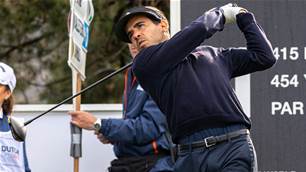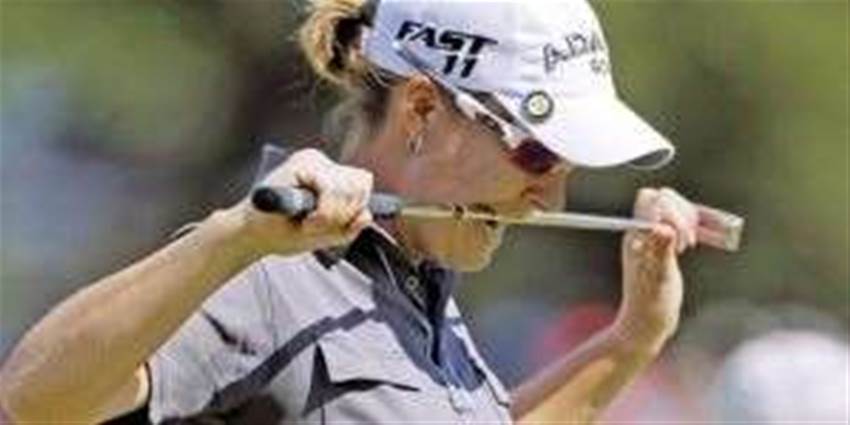Lindsey Wright's win in the Women's New Zealand Open recently was described as a "Victory out of the wilderness".

“I guess I have been in a position where I have always been the bridesmaid and never the bride, so to speak, and you kind of get used to it, which is probably not the best way to think but it’s good to win a tournament. What it has done is change my psyche a bit as far as being in that position and saying to myself, ‘Hey, hang on I can win this.’”
When I suggest, “Bet you’re glad you didn’t go through with quitting last year,” Wright bursts into laughter.
“Yeah, it’s funny … I was going to quit and now I’ve won this bloody tournament and have exemptions in America and Europe,” she laughs.
“I was pretty nervous coming down the stretch there … would have loved a glass of wine coming down the stretch.
“I caddied for myself for two days and then my good friend Vicky Uwland-Thomas (fellow Tour player) jumped on the bag. She was as stressed out as I was, I think.
“We were both quite nervous and I knew that, for me, it was just a matter of controlling my breathing. If I didn’t I knew I would get tense in the shoulders and start making mistakes. I was staying in the moment, doing the right things, doing what I had been doing for six weeks.”
She now hopes the momentum and confidence gained from the win will translate into her performances abroad this year. After a three-month campaign on the LPGA, Wright plans to head to Europe in July to play the big events there and enjoy the new experiences that Tour will present.
“I’m now a part of the Ladies European Tour and I’m so excited because I know a lot of the girls and I like the people,” she says. “To be honest, I like a challenge and I guess it’s like a lot of things; you get fed up with doing the same thing all the time. Playing on the LPGA has become a bit tedious the past few years, so going to Europe has got a bit of the fire going inside (me).
“I’ve really enjoyed my time in the US and I would never ever spit in the face of the opportunities it has given me, but I’m also an Aussie country girl and where I grew up people talk, go out for a beer without any drama. It’s a bit too dramatic in the States for me.”
Wright has been playing golf in the United States since she left the Australian Institute of Sport golf program in 1999 to attend Pepperdine University in Los Angeles. She turned professional in 2003 and played on the Futures Tour and gained her promotion to the LPGA Tour the following year. Wright says had she not qualified for the LPGA straight away she would have gone to Europe back then because of the camaraderie that existed, and still does, between the players and is something she says is sadly lacking on the LPGA.
“I look at golf as a whole. I’m not a golf freak, it’s not just about golf,” she says. “I feel the major factor of going to Europe is the people and the culture of the Tour. If I’m not around fun people or people with some energy and enthusiasm it wears me down and I have certainly felt that being in the US for so long. Playing this game is not about the money for me, it’s about the overall enjoyment of playing … and doing it under five-and-a-half hours.
“They say money is the root of all evil. Some girls start in Europe, then head to the LPGA, but they head back to Europe because they realise they’d rather play for 30 or 40 percent less money than on the LPGA and be happy. The competitive, cut-throat culture of the LPGA gets to them.
“The US is a good place to earn your money, it’s the best and most competitive women’s Tour in the world but it comes to a point where you want to enjoy your life as well. Being happy is important.
 “LET players work as hard as the LPGA players but when they get off the course, the clubs get put away and they all socialise together … It’s like, ‘Which pub tonight?’ or, ‘Where will we eat on Saturday night?’ I don’t think I’ve met one player who disliked playing in Europe. I’m so looking forward to going down that path.”
“LET players work as hard as the LPGA players but when they get off the course, the clubs get put away and they all socialise together … It’s like, ‘Which pub tonight?’ or, ‘Where will we eat on Saturday night?’ I don’t think I’ve met one player who disliked playing in Europe. I’m so looking forward to going down that path.”
On the course, her game is in a better place than it was. She has a renewed enthusiasm for practice and playing and Wright says time away from the game has added a new weapon to her playing strategy – patience.
“It is a cliché but I am playing within myself much more,” she explains. “For example, I know I hit a rescue club 176 yards and if I have a 180-yard carry I’m not going to bullshit myself and hit it, which is something I would have done before. Now, I’ll just lay-up and hit a wedge in for my next. I’m almost playing like a veteran and that’s been a big shift in the way I think on the golf course.
“For a while there I didn’t think I was good enough to compete alongside some of the younger players who hit it further and seem fearless. When really I haven’t fully utilised the strengths of my game, I’ve been operating at 50 percent. The likes of Michelle Wie and Brittany Lincicome … they hit it long for sure, but I can still beat them by playing smarter and using my experience.
“Since having this mental thing it’s definitely changed my outlook on the game. And I look at it and I have a laugh because it really is a crappy game to play. You have a day where you make all the putts and think, ‘I’m never going to shoot 75 ever again and everything is going to be under par,’ and then all of a sudden you come off the course with a 76. But you can’t let it beat you up because it’s something you can’t control.”
Most importantly Wright’s battle with depression is done. She’s healthy and her love of the game has returned, which her performances thus far in 2012 reflect.
“I play golf because I enjoy it. The minute I stop enjoying it my results will speak for themselves,” Wright says.
Related Articles

February 2025 Issue of Golf Australia magazine

Inside Golf Australia: December 2024













